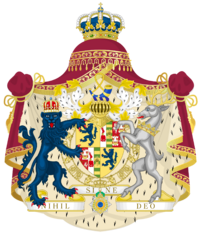Reichswehr (Mascylla): Difference between revisions
No edit summary |
No edit summary |
||
| Line 48: | Line 48: | ||
The ''Reichswehr'' has historically played a major role in the history of Mascylla as a whole, beginning with the political unification of the country through the [[War of the Five Kings|military victory]] of the leading [[Kingdom of Aldia]] and [[Elbgau Confederation]] in 1793. It was a central aspect and part of societal culture, interior, foreign and colonial policy in the [[Mascyllary Kingdom]] (1793–1923), and enabled a pivotal contribution to the eventual victory of Mascylla and the [[Armala Coalition]] over the [[Central Alliance (Aurorum)|Central Alliance]], mostly the [[Second Cuthish Empire|Cuthish Empire]], during the [[Great War (Aurorum)|Great War]] (1911–16). Subsequently, the armed forces and its leadership were an important political power in the [[Mascyllary Revolution]] (1923–24) and struggling [[Mascyllary Revolution|May Republic]], the 1923 Pereuth mutiny of Mascyllary sailors and Flussmund army revolt being the initial instigators of the civil unrest, acting as a {{wp|deep state}} and {{wp|cadre|cadre army}} before ultimately pledging loyalty to the republic in return for a post-revolution {{wp|constitutional monarchy}} under [[Monarchy of Mascylla|Maximilian I]]. The onset of the [[Great Game (Aurorum)|Great Game]] once again underlined the military's importance, and the need for a modern and sophisticated armed forces precipitated the Act for National Security in 1959, re-organizing it to its current form by merging multiple offices into the Ministry of Defence and reworking the command structure of its branches. | The ''Reichswehr'' has historically played a major role in the history of Mascylla as a whole, beginning with the political unification of the country through the [[War of the Five Kings|military victory]] of the leading [[Kingdom of Aldia]] and [[Elbgau Confederation]] in 1793. It was a central aspect and part of societal culture, interior, foreign and colonial policy in the [[Mascyllary Kingdom]] (1793–1923), and enabled a pivotal contribution to the eventual victory of Mascylla and the [[Armala Coalition]] over the [[Central Alliance (Aurorum)|Central Alliance]], mostly the [[Second Cuthish Empire|Cuthish Empire]], during the [[Great War (Aurorum)|Great War]] (1911–16). Subsequently, the armed forces and its leadership were an important political power in the [[Mascyllary Revolution]] (1923–24) and struggling [[Mascyllary Revolution|May Republic]], the 1923 Pereuth mutiny of Mascyllary sailors and Flussmund army revolt being the initial instigators of the civil unrest, acting as a {{wp|deep state}} and {{wp|cadre|cadre army}} before ultimately pledging loyalty to the republic in return for a post-revolution {{wp|constitutional monarchy}} under [[Monarchy of Mascylla|Maximilian I]]. The onset of the [[Great Game (Aurorum)|Great Game]] once again underlined the military's importance, and the need for a modern and sophisticated armed forces precipitated the Act for National Security in 1959, re-organizing it to its current form by merging multiple offices into the Ministry of Defence and reworking the command structure of its branches. | ||
Though the [[Monarchy of Mascylla|Monarch]] is traditionally the {{wp|commander-in-chief}} of the armed forces, the [[Prime Minister of Mascylla|Prime Minister]] ''de facto'' maintains this position jointly with the [[First Falkner cabinet|Minister of Defence of the Realm]] during peacetime, although the Monarch may supersede the Prime Minister's powers by a two-thirds majority consent in the [[Reichsrat]] and on the behalf and agreement of a Counselor of Defence (''Verteidigungskonsul'') proposed by the government. Despite these offices having significant powers, the ability to mobilize forces is vested in the Reichsrat, which can declare a state of war, accordingly with the Ministry of Defence of the Realm. The ''Reichswehr'' is one of the world's largest armed forces by personnel size, and even though {{wp|conscription}} has been temporarily suspended since 2002, it has been able to derive its personnel from long-lasting enthusiasm by the public as paid {{wp|volunteer military|volunteers}}. It is generally considered to have access to {{wp|power projection}} capabilities on a global scale, contributes significantly to [[BDTA]] {{wp|collective security}} and defense spending with the [[List of Auroran countries by different metrices|single-highest military budget]] in the world, and possesses up to 390 {{wp|strategic nuclear weapon|strategic nuclear weapons}} under a {{wp|nuclear triad}} doctrine and {{wp|nuclear sharing}} agreement with [[Falland]]. | Though the [[Monarchy of Mascylla|Monarch]] is traditionally the {{wp|commander-in-chief}} of the armed forces, the [[Prime Minister of Mascylla|Prime Minister]] ''de facto'' maintains this position jointly with the [[First Falkner cabinet|Minister of Defence of the Realm]] during peacetime, although the Monarch may supersede the Prime Minister's powers by a two-thirds majority consent in the [[Reichsrat]] and on the behalf and agreement of a Counselor of Defence (''Verteidigungskonsul'') proposed by the government. Despite these offices having significant powers, the ability to mobilize forces is vested in the Reichsrat, which can declare a state of war, accordingly with the Ministry of Defence of the Realm. The armed forces are administered by the Security Committee (''Sicherheitskommittee'') of the Ministry of Defence, headed by the Minister of Defence, which is in turn advised by the General Defence Staff (''Allgemeiner Verteidigungsstab''), composed by {{wp|statute}} of the most highly-ranking {{wp|officer|military officers}} and chaired by a Chairman. The ''Reichswehr'' is one of the world's largest armed forces by personnel size, and even though {{wp|conscription}} has been temporarily suspended since 2002, it has been able to derive its personnel from long-lasting enthusiasm by the public as paid {{wp|volunteer military|volunteers}}. It is generally considered to have access to {{wp|power projection}} capabilities on a global scale, contributes significantly to [[BDTA]] {{wp|collective security}} and defense spending with the [[List of Auroran countries by different metrices|single-highest military budget]] in the world, and possesses up to 390 {{wp|strategic nuclear weapon|strategic nuclear weapons}} under a {{wp|nuclear triad}} doctrine and {{wp|nuclear sharing}} agreement with [[Falland]]. | ||
==Command structure== | ==Command structure== | ||
Revision as of 22:39, 12 May 2022
This article is incomplete because it is pending further input from participants, or it is a work-in-progress by one author. Please comment on this article's talk page to share your input, comments and questions. Note: To contribute to this article, you may need to seek help from the author(s) of this page. |
| Imperial Defence of Mascylla | |
|---|---|
| Maskillische Reichswehr | |
 Logo of the Reichswehr | |
| Motto | Das Schwert und Schild des Reiches. (The Sword and Shield of the Realm.) |
| Founded | 29 July 1793 Current form founded on 15 April 1959 |
| Service branches | Reichswehr Joint Medical Service (Reichswehrmedizinbasis) Joint Support Services (Streitkräftebasis) |
| Headquarters | Königsreh, Mascylla |
| Leadership | |
| Commander-in-Chief | Queen Dorothea I (de jure) |
| Minister of Defence | Rüdiger Meißert |
| Chief of the General Defence Staff | |
| Manpower | |
| Military age | 18 |
| Conscription | None (suspended since 2002) |
| Active personnel | 226,031 (2020) (ranked 2nd) |
| Reserve personnel | 89,120 (2020) |
| Deployed personnel | 28,000 |
| Expenditures | |
| Budget | Ӄ80.2 billion (US$92.1 billion) (2019) |
| Percent of GDP | 2.2% |
| Industry | |
| Domestic suppliers | Albatross Öhrenwerftewerk Schütze & Gneisau Wiesar Verteidigung Brecht-Gühren GmBH AGA |
| Foreign suppliers | |
| Annual exports | Ӄ19.9 billion (US$12.4 billion) (2018) |
| Related articles | |
| History | |
The Imperial Defence of Mascylla, or interchangibly called the Mascyllary Reichswehr (Hesurian: Maskillische Reichswehr) or simply the Reichswehr, is the armed forces of the Crowned Republic of Mascylla and their adjacent civil administration and authorities, being divided into a sole military part (armed forces or Stretkräfte) and a civilian counterpart (Zivilverwaltung). Its service branches encompass the Mascyllary Army (Reichsheer), the Mascyllary Navy (Marine), the Mascyllary Naval Marine Corps (Marinekorps), the Mascyllary Air Force (Luftheer), the Reichswehr Joint Medical Service (Reichswehrmedizinbasis), and the Joint Support Services (Streitkräftebasis).
The Reichswehr has historically played a major role in the history of Mascylla as a whole, beginning with the political unification of the country through the military victory of the leading Kingdom of Aldia and Elbgau Confederation in 1793. It was a central aspect and part of societal culture, interior, foreign and colonial policy in the Mascyllary Kingdom (1793–1923), and enabled a pivotal contribution to the eventual victory of Mascylla and the Armala Coalition over the Central Alliance, mostly the Cuthish Empire, during the Great War (1911–16). Subsequently, the armed forces and its leadership were an important political power in the Mascyllary Revolution (1923–24) and struggling May Republic, the 1923 Pereuth mutiny of Mascyllary sailors and Flussmund army revolt being the initial instigators of the civil unrest, acting as a deep state and cadre army before ultimately pledging loyalty to the republic in return for a post-revolution constitutional monarchy under Maximilian I. The onset of the Great Game once again underlined the military's importance, and the need for a modern and sophisticated armed forces precipitated the Act for National Security in 1959, re-organizing it to its current form by merging multiple offices into the Ministry of Defence and reworking the command structure of its branches.
Though the Monarch is traditionally the commander-in-chief of the armed forces, the Prime Minister de facto maintains this position jointly with the Minister of Defence of the Realm during peacetime, although the Monarch may supersede the Prime Minister's powers by a two-thirds majority consent in the Reichsrat and on the behalf and agreement of a Counselor of Defence (Verteidigungskonsul) proposed by the government. Despite these offices having significant powers, the ability to mobilize forces is vested in the Reichsrat, which can declare a state of war, accordingly with the Ministry of Defence of the Realm. The armed forces are administered by the Security Committee (Sicherheitskommittee) of the Ministry of Defence, headed by the Minister of Defence, which is in turn advised by the General Defence Staff (Allgemeiner Verteidigungsstab), composed by statute of the most highly-ranking military officers and chaired by a Chairman. The Reichswehr is one of the world's largest armed forces by personnel size, and even though conscription has been temporarily suspended since 2002, it has been able to derive its personnel from long-lasting enthusiasm by the public as paid volunteers. It is generally considered to have access to power projection capabilities on a global scale, contributes significantly to BDTA collective security and defense spending with the single-highest military budget in the world, and possesses up to 390 strategic nuclear weapons under a nuclear triad doctrine and nuclear sharing agreement with Falland.
Command structure
Military installations
Expenditure
Nuclear weapons
Personnel
Recruitment
Armed forces branches
Main article: Mascyllary Navy
Army
Main article: Mascyllary Army
Air Force
Main article: Mascyllary Air Force
